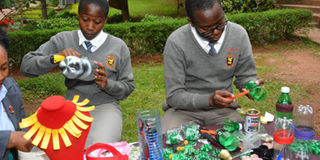Schools grooming students in business

Students use plastic bottles to make necklaces and decorations they sell to their colleagues.
Increasingly, schools are awake to the fact that theoretical knowledge is not sufficient in building a complete student. In an interview with Daily Monitor last year, Lawrence Muwonge, the head teacher of Buddo Secondary School, noted that, “without a doubt, the world has changed. You cannot survive on concepts alone. I usually tell my students they if they maximise the opportunity at school and equip themselves with any of the skills available at school, they would be much better than those who only focused on academic work in future.”
As seen with the creation of the Business, Technical, Vocational Education and Training (BTVET) by the Education ministry, some schools, individuals, private initiatives and the corporate world are joining hands to bridge the skills gap in the Uganda education system.
Among such initiatives is the recent Stanbic National Schools Championship where students and their teachers from four schools; Bweranyangi Girls’ Senior Secondary School from western Uganda, Nakanyonyi Girls’ Secondary School from eastern, Muni Girls Secondary School from northern and Mengo Secondary School from central region were tasked to come up with business ideas and execute them, as part of the competitions, after a four-day skills training boot camp.
Petra Namuyiga, a senior four student from Mengo Senior School, explains the competition as a whole new learning experience for her. After getting to know about it through an announcement at the school assembly, she decided this was something she could give a try. “I like taking opportunities, so I thought, ‘if it is an opportunity and it is available, why can’t I go for it?” she says.
Attending the boot camp meant perseverance until the final stages of the competition, something Namuyiga managed to do together with her teammate (Marvin Nicholas Kimbugwe).
“I think the boot camp was the best learning experience I have ever had outside class. In class, you learn things and have them in the head. But there, we learned practical things that you never get to learn anywhere. We were trained in soft skills such as confidence and practical ones, especially in business,” she says.
Together with her teammate, they came up with a business idea of recycling plastics, which also became the best business idea presented at the camp, according to the judges.
Changing communities
“Before we came up with the final idea, we had other ideas and they all centered on saving the environment. We wanted to make biogas and recycling paper but they were not good enough. But while moving around school, we could see plastic bottles littered around. Even in Kampala —you see all those plastic bottles, so we realised that this was a bigger problem. That is how we came up with the idea of recycling bottles,” Marvin Nicholas Kimbugwe, a Senior Six student at Mengo Secondary School, shares.
In their recycling project also called ‘Mengreen’ they collect plastic bottles in and around their school and use them to make different items. “At first we thought we could collect them and sell them to plastic companies. But because we had been taught about using what you have to get something more valuable, we refined the idea to value addition,” Namuyiga says.
They, therefore, use plastics to make jewelry, piggy banks, dust bins, lamp holders, flower vases, decorative items and for planting vegetables.
“There is a lot of pollution today yet there is little being done to save the environment. But it is the same environment that fed our forefathers, the same feeding us and the same that will feed our children. So our business is not largely about the money but conserving the environment,” says Kimbugwe.
Creativity
Female students in Bweranyangi Girls’ Senior Secondary School do not have to struggle with having their hair cleaned anymore since Dorcus Kiconco and Amanda Asiimire started a beauty salon at school. In a school where girls in A-Level are allowed to grow hair but without a facility to give them the service within school, they jumped at the opportunity.
“We have basically started with washing student’s hair. None of the students has hairdressing skills yet but one of the students has natural hair, so we use the skills which we already possess by caring for our own hair to run the salon. We, however, plan to hire a hairdresser to teach us more skills,” Diane Kyobutungi, the patron teacher, explains.
In addition, students of Nakanyonyi Girls’ Secondary School (Viviane Kifuko and Lucy Namazzi) started a drinks and snacks business. “We settled for that idea because we could produce products at a fairly low price but at the same time have a variety of products from the same raw materials and at different prices because our customers are students,” said Namusobya, their patron teacher, notes. Currently, they bake pancakes, half cakes, bread, cakes, Mandazi plus juice.
“We occupy two rooms at the school production room, and the other the display. We engage in baking after classes, but we also hired a skilled person to teach us so that our products are of high quality. During break time, we sell our products to the students,” she explains.
Similarly, Able Martha and Viola Sitima of Muni Girls’ Secondary School started Tasty Delights, a snacks business producing and selling snacks such as hard corns, groundnuts, doughnuts, cup cakes, cookies, among others to the staff and their school community.
“We decided we would reach our customers through direct distribution on weekends and through the school canteen as a middleman. We also reached our customers through posters, fliers in school, especially during the assembly, but also created a social media platform to reach the staff. All these are strategies we learned from the camp,” Emma Angundaru, the patron, shares.




